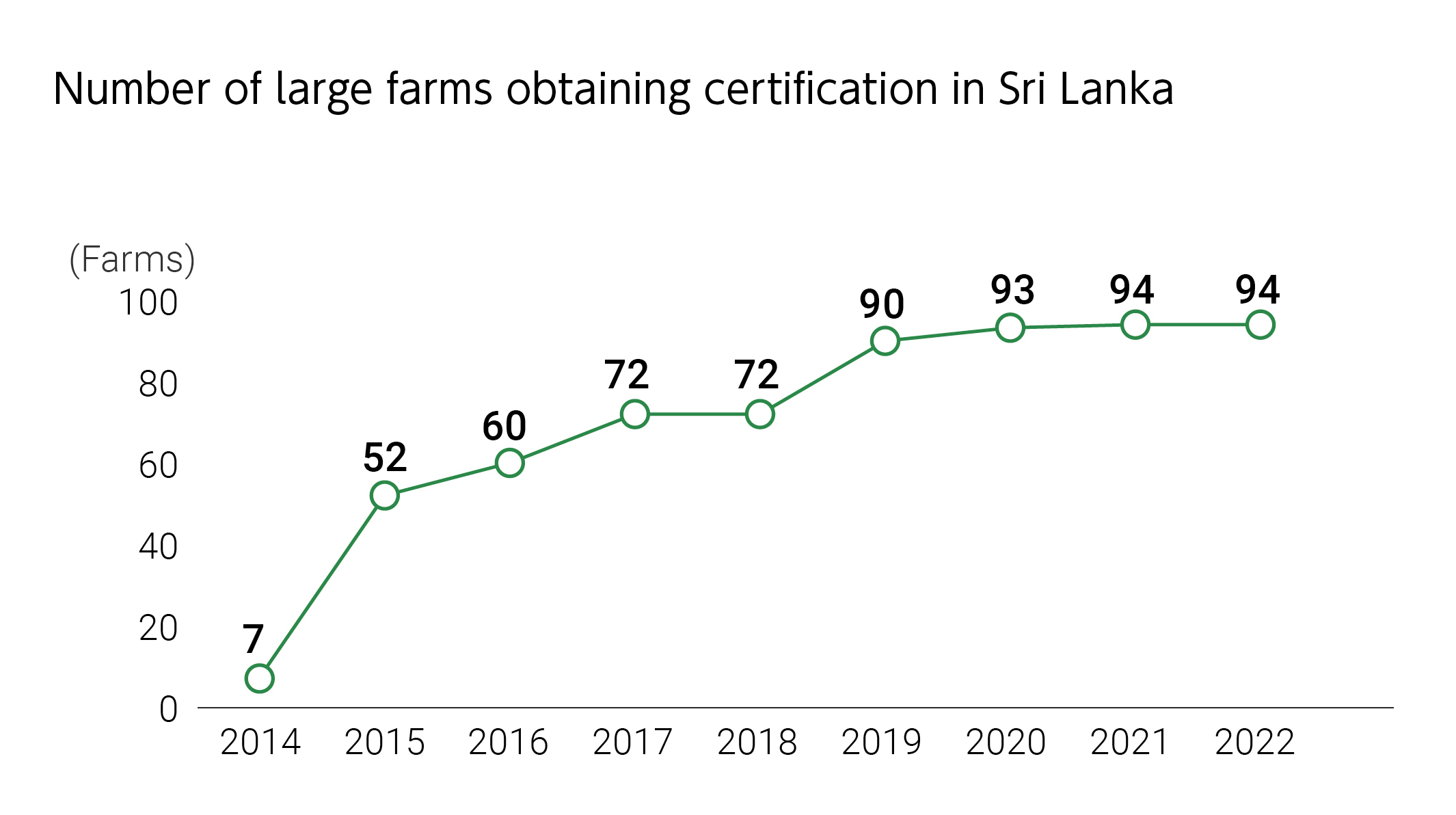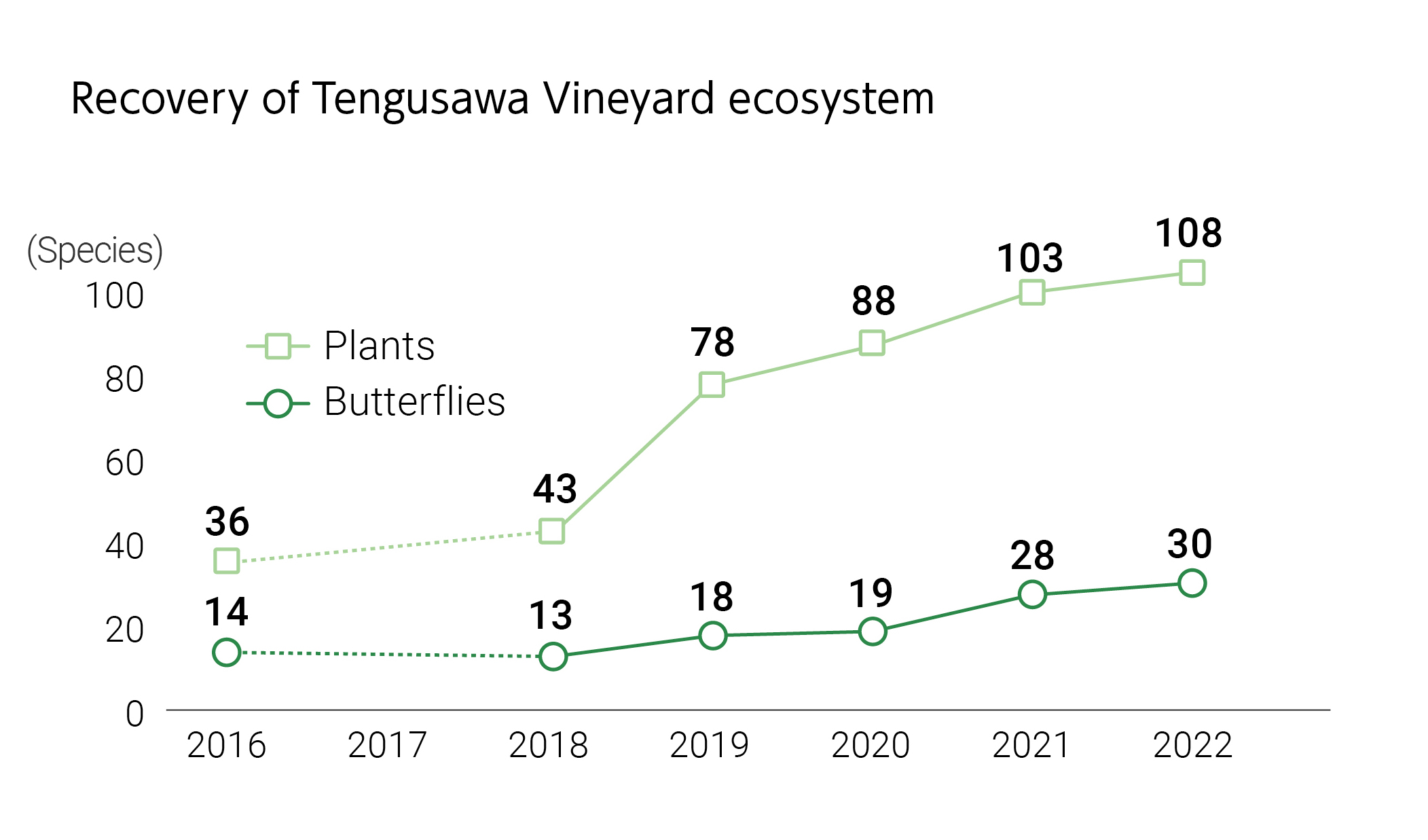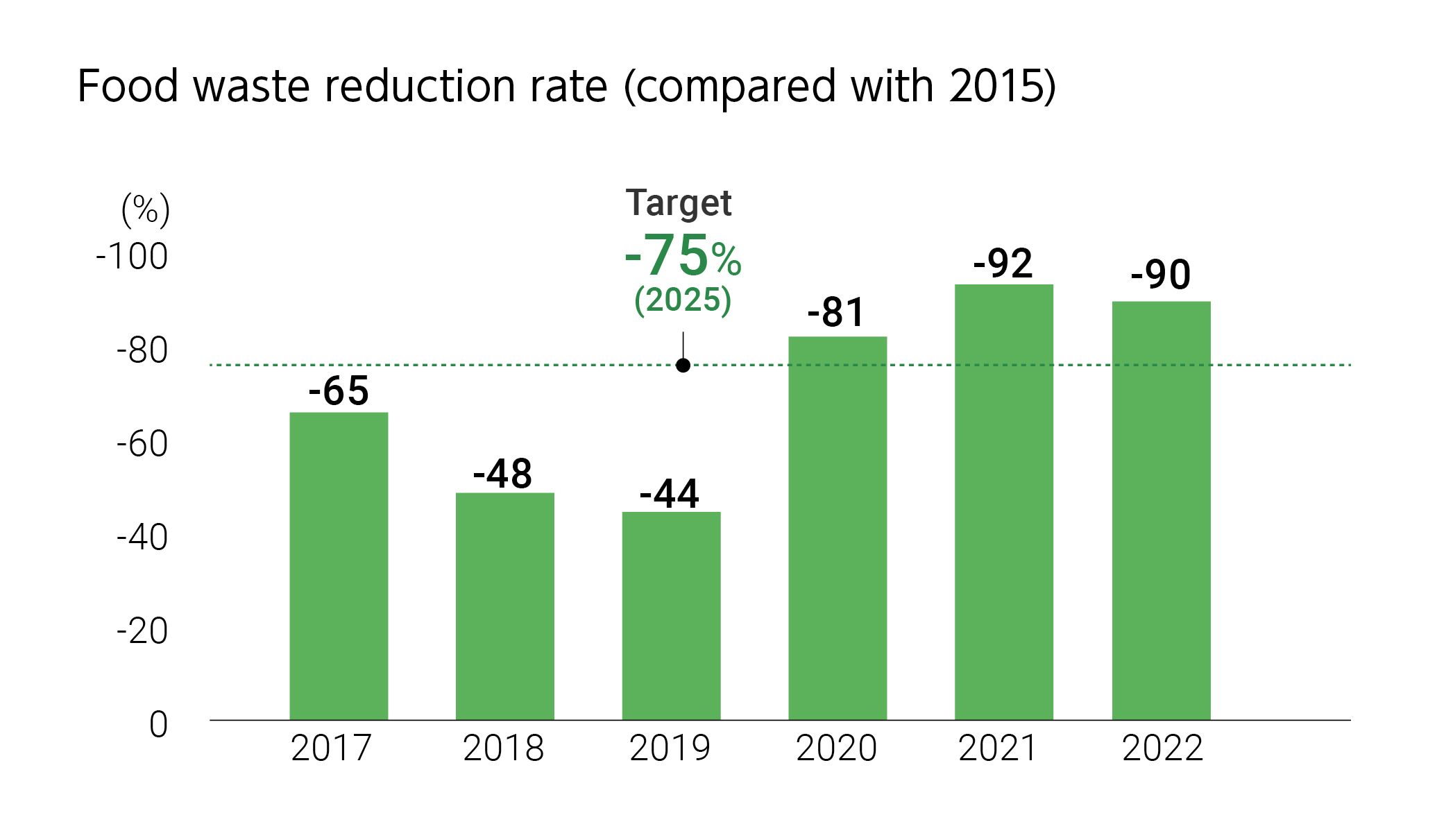Biological Resources
Sustainable biological resources
Based on our understanding of the characteristics of natural capital, we have analyzed and evaluated risks and opportunities by using scientific tools to advance solutions to biological resource challenges. Agricultural raw materials often bring unique characteristics of the areas that produce them to be reflected in products. Therefore, we need both a local perspective of "dependence" on the crops produced by a particular "place" and a global perspective that climate change has a significant impact on the yield and quality of agricultural commodities. In addition to scenario analysis based on the TCFD recommendations, we use the processes advocated by TNFD Framework. We will also develop a holistic approach to solving issues that takes trade-offs between climate change and natural capital into account.
- Main Activities
-
-
Revised the Kirin Group Action Plan for the Sustainable Use of Biological Resources to add coffee and soybeans to the existing black tea, paper, and palm oil in September 2021.
-
Provided training to support acquisition of Rainforest Alliance certification for large farms in Sri Lanka (4 farms: cumulative total from 2022 to 2024).
-
Started sales of year-round products that use tea leaves from certified farms (since 2021).
-
Developed the Regenerative Tea Scorecard as a tool to promote environmentally regenerative agriculture in Sri Lankan tea farms with the Rainforest Alliance (from 2023).
-
Over 200 youth have participated in educational programs for wildlife conservation in Sri Lanka (2021).
-
Expanded our support for the acquisition of Rainforest Alliance certification to coffee farms in Vietnam. 350 farms completed the transition to new certification standards and 309 farms had newly acquired certification as of the end of 2022.
-
Maintained the use of FSC-certified paper or recycled paper for 100% of office paper used in Japanese Alcohol and Non-alcoholic Beverages Businesses (since 2020).
-
Château Mercian Mariko Vineyard has been selected as an approved Nationally Certified Sustainably Managed Natural Sites contributing to the 30by30 target by the Ministry of the Environment (2023).
-
Trial disclosure based on the LEAP approach proposed in the TNFD Frame
-
Target
Targets related to support for the acquisition of certification by tea farms in Sri Lanka (CSV commitment: 2022 to 2024, cumulative)
- Number of large farms assisted to obtain certification
- 15
- Number of small farmers assisted to obtain certification
- 5,350
Actual results
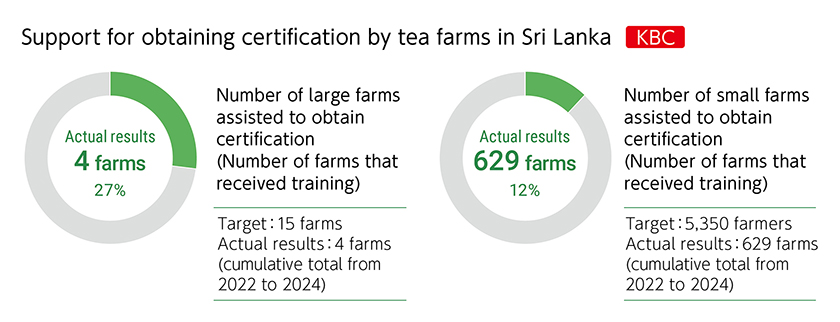
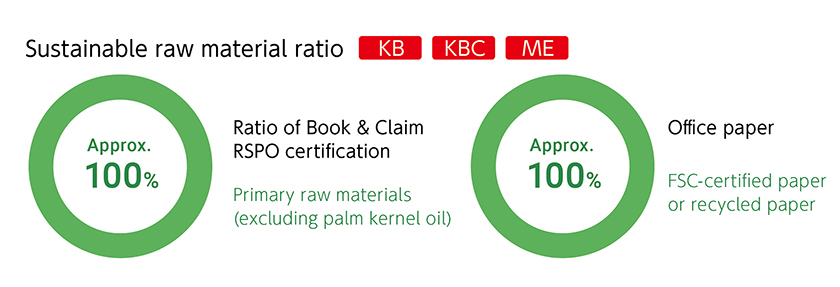

Materiality Analysis of Biological Resources
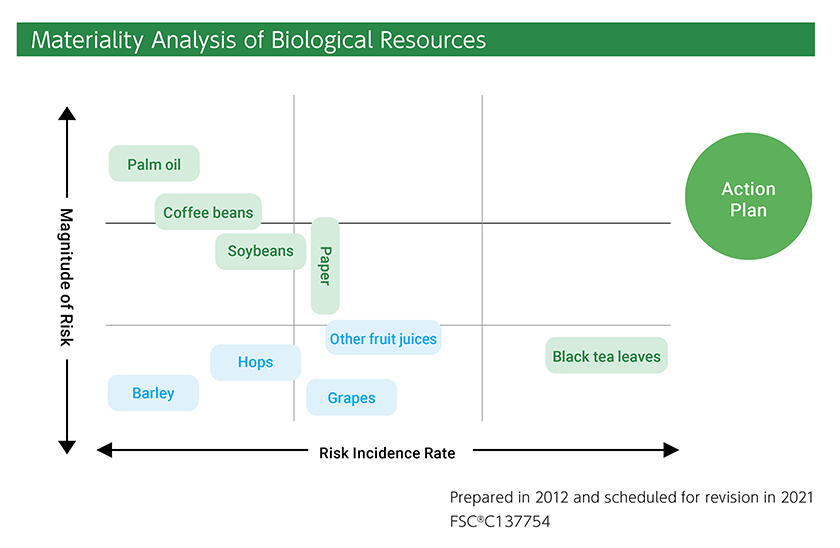
Tea farms
Support for acquisition of Rainforest Alliance Certification
Since 2013, The Kirin Group has supported Sri Lankan tea farms to acquire Rainforest Alliance certification. As of end of 2023, 94 large tea farms in Sri Lanka, approximately 30% of all certified large tea farms, acquired the certification by our support. In August 2021, we began sales of year-round products that use tea leaves from certified tea farms.
Kirin Gogo-no-Kocha is Japan's leading packaged black tea brand with a share of approximately 50% of the Japanese market. Since the launch of the brand, we have used Sri Lankan tea leaves as the main ingredient. As of 2023, approximately 20% of the Sri Lankan tea leaves imported by Japan were used for Kirin Gogo-no- Kocha. We considered purchasing tea leaves from certified farms to ensure sustainable procurement, but found that at the time, Sri Lanka was just after the end of the civil war and there were only a limited number of farms that were able to access training on their own. Therefore, we decided to create a positive impact on the sustainability of tea farmers by providing certification assistance to as many Sri Lankan tea farms as possible, rather than leaving behind those farms that have difficulty obtaining certification on their own.
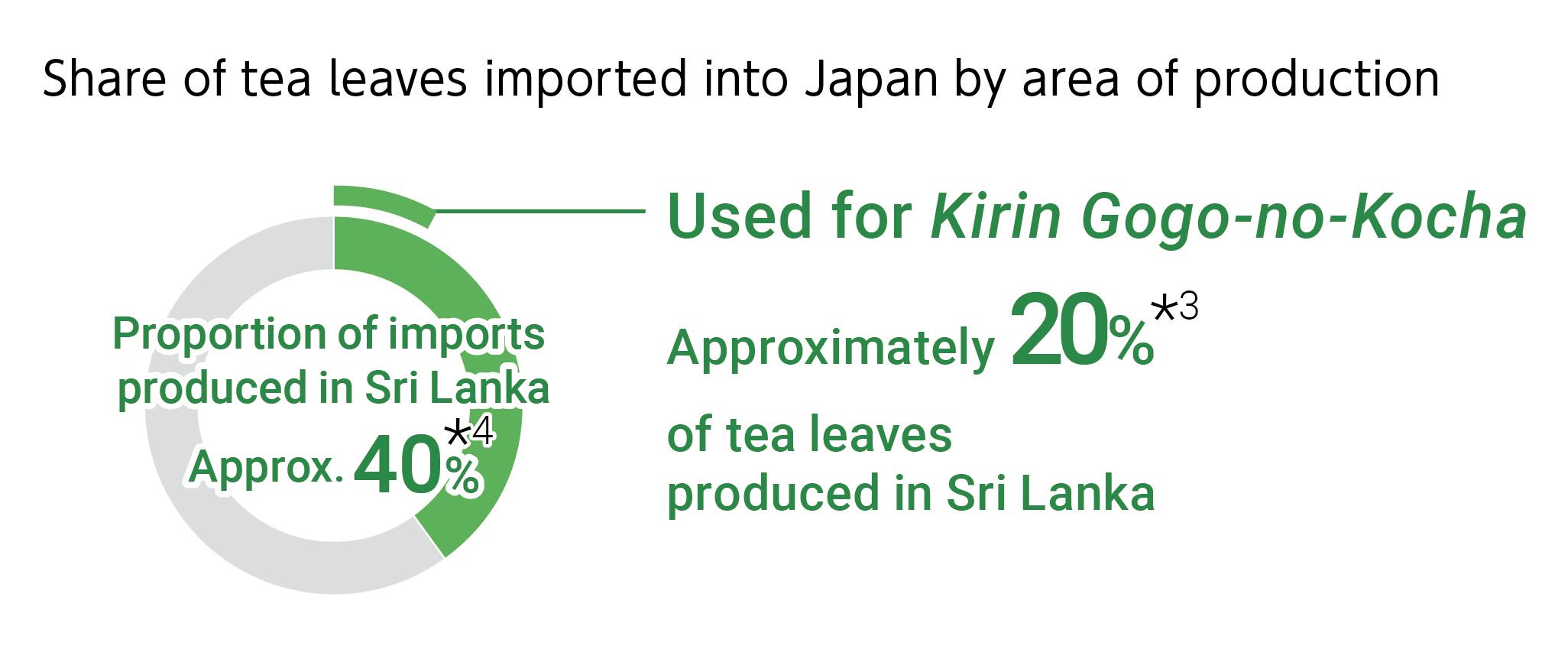
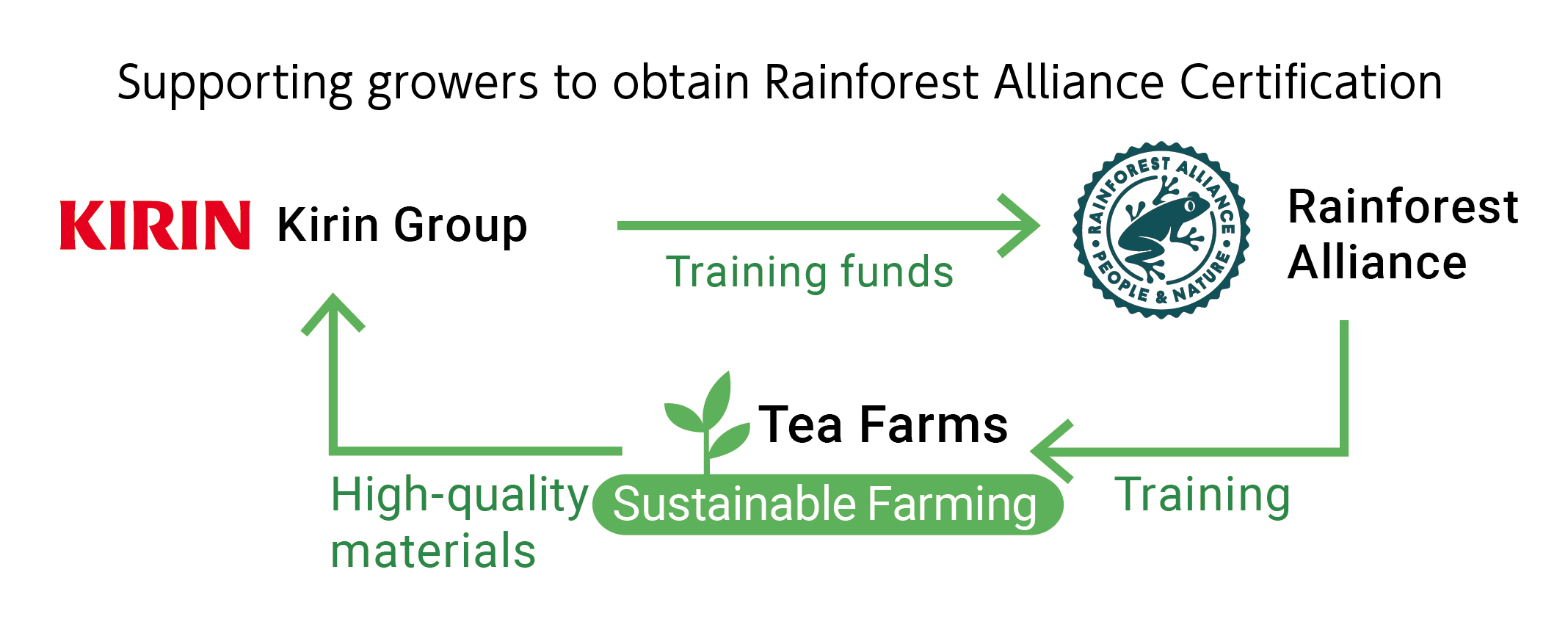

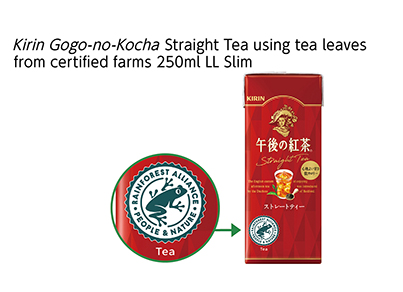
-
*1Certification is awarded to farms that meet comprehensive standards for sustainable agriculture to create a better future for people and nature.https://www.rainforest-alliance.org
-
*2Intege SRI+ Tea drink market 2023 Cumulative sales value/value share
-
*3Kirin research
-
*4Customs clearance statistics, Ministry of Finance Japan
-
*5One farm gave up the continuation of its certification in 2023
Training content
In Sri Lanka, droughts and frequent heavy rains caused by climate change have become serious problems. Urbanization, industrialization, soil erosion and outflow as a result of the inappropriate use of land are also major concerns. Because large tea plantations are often located on steep, sunny slopes, heavy rains not only wash away the fertile soil, but in the past have caused landslides that have killed people living on the plantations.
Covering the ground with grass (cover crop) not only enriches the ecosystem but also is an effective adaptation measure to climate change, such as preventing soil runoff from directly hitting the ground during heavy rains and retaining water during droughts. The training teaches how to identify grasses that have a negative impact on tea cultivation and ensures that the ground in the tea plantation is covered with good, deep-rooted grasses.
Training also teaches scientific methods to increase yields while reducing the use of pesticides and fertilizers. In addition to protecting the forests, the reduced expenditure on pesticides and fertilizers improve the plantation's profitability and increase the safety of the tea leaves.
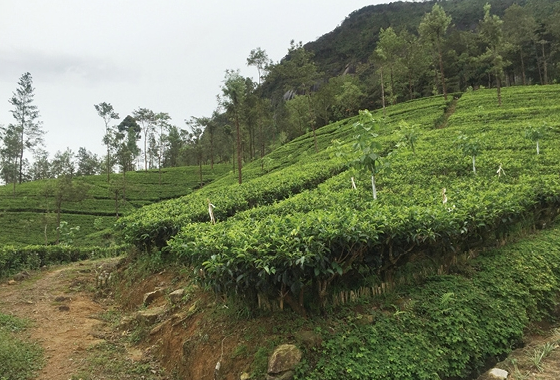
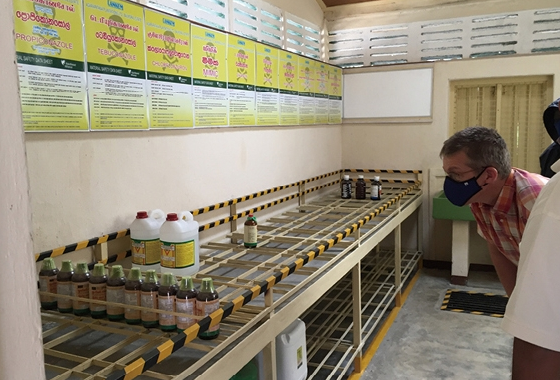
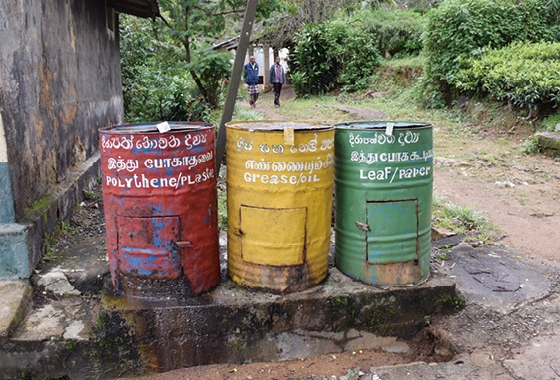
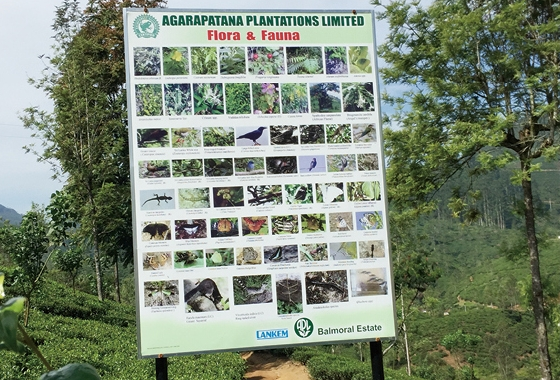
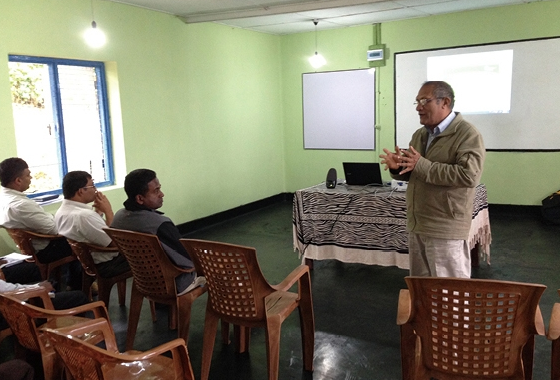
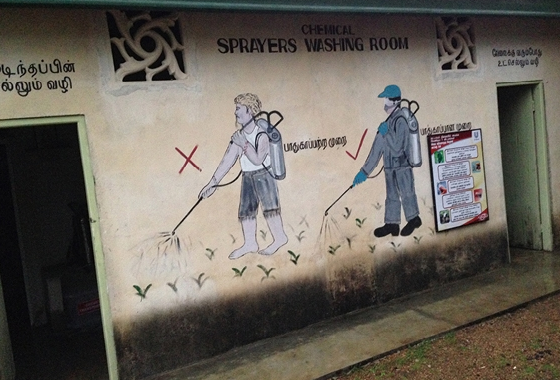
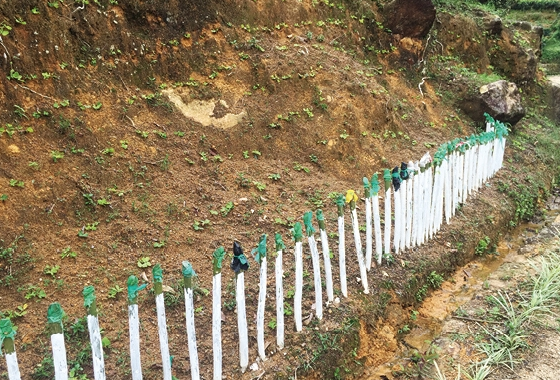
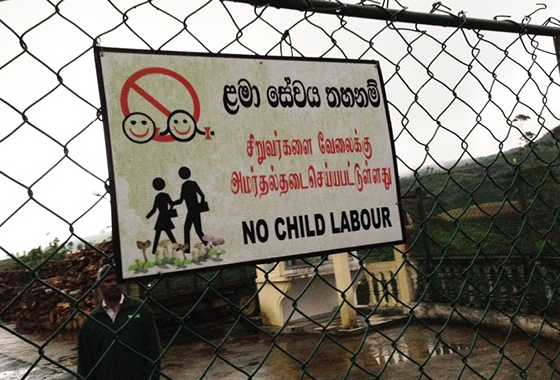
Social and economic impact of certification
Based on data from a specific farm, our support for certification provides positive impacts, both financially and socially, on some farms and farm workers, and makes areas where raw materials are produced more sustainable.
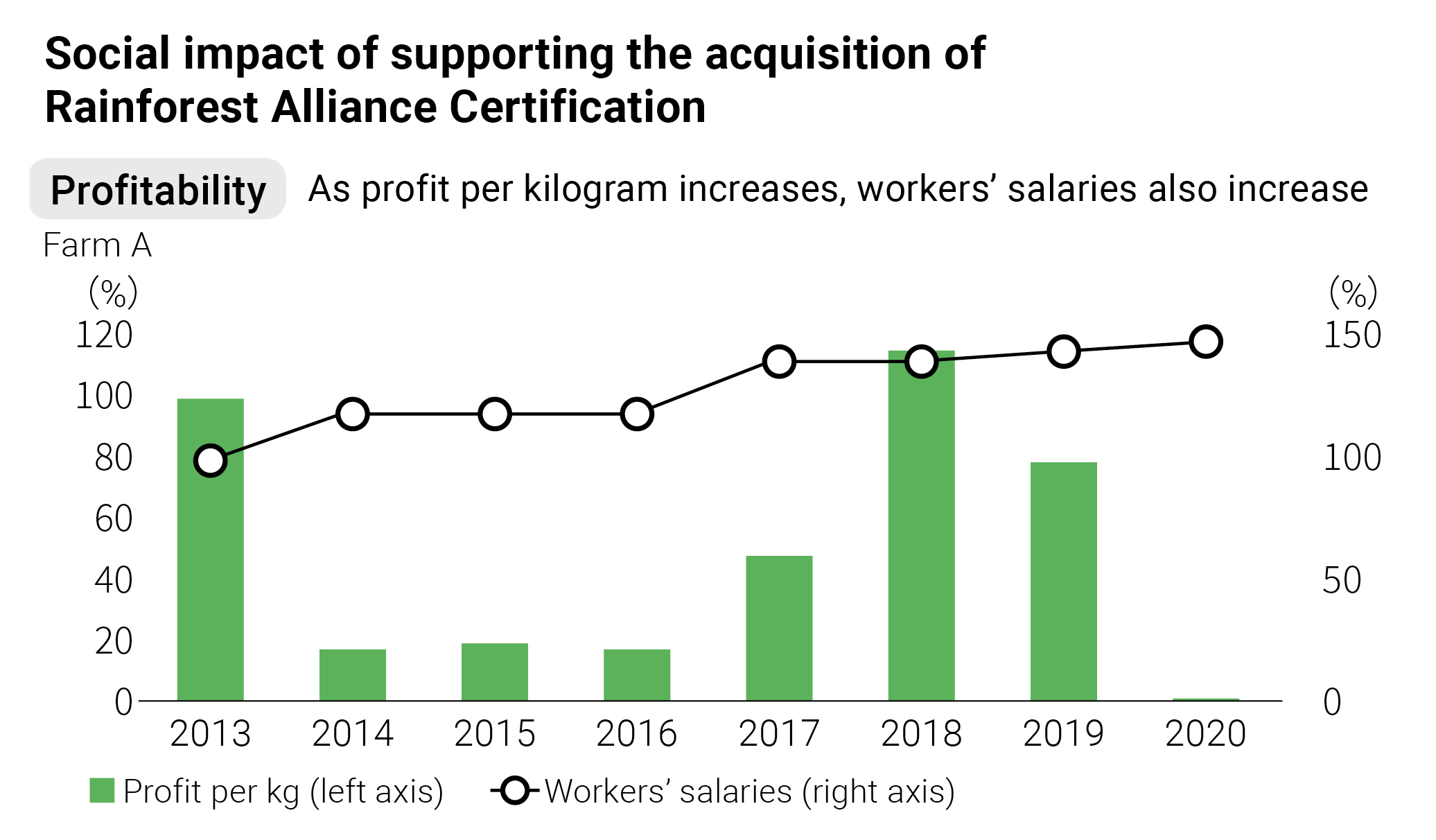
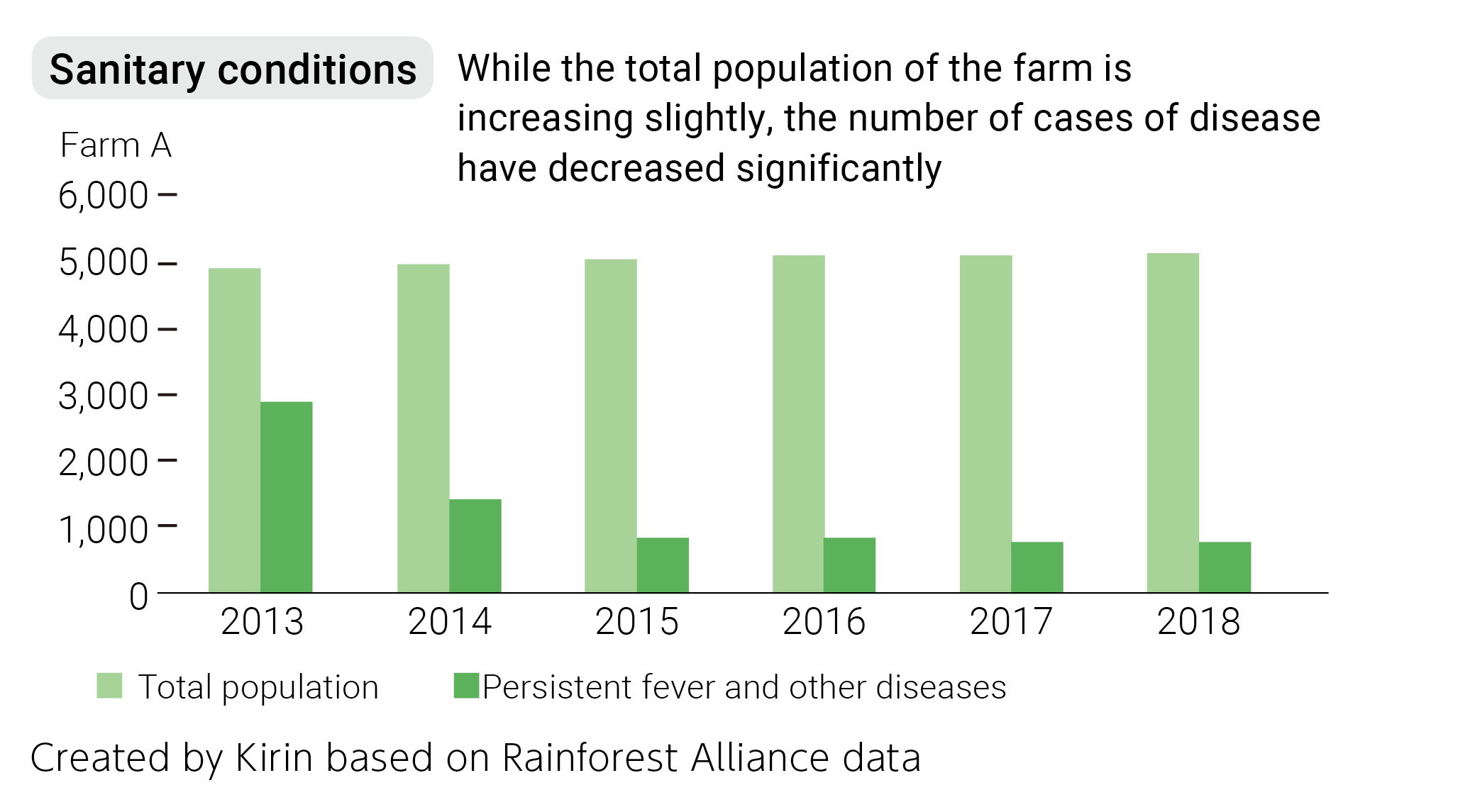
Support for small farms to obtain certification
In 2018, we began supporting small farms to acquire certification and provided training to 620 small farms by the end of 2023. From 2022 to 2024, we plan to provide training to a cumulative total of 5,350 farmers.
In Sri Lanka, there are said to be many small family-operated farms, with the total number in the hundreds of thousands. Tea leaves from small farms are collected by nationally licensed collectors and are then sold to nearby large farms where they are processed and shipped to various regions. Tea leaves from small farms can sometimes account for as much as half or more of the tea leaves processed in the large farms' plants. We thus determined the acquisition of certification at small tea farms is also necessary for the sustainability of black tea leaves.
For small farms to obtain certification, the training program organizes teams consist of small farms and appoint leaders for the teams. Local trainers train an elected leader, who will then train the team's smallholders to learn the certification standards. This program often takes time to start actual training since it is necessary to begin by organizing the small farms into teams. Thus, the process for small farms to acquire certification is more difficult than that for large farms.
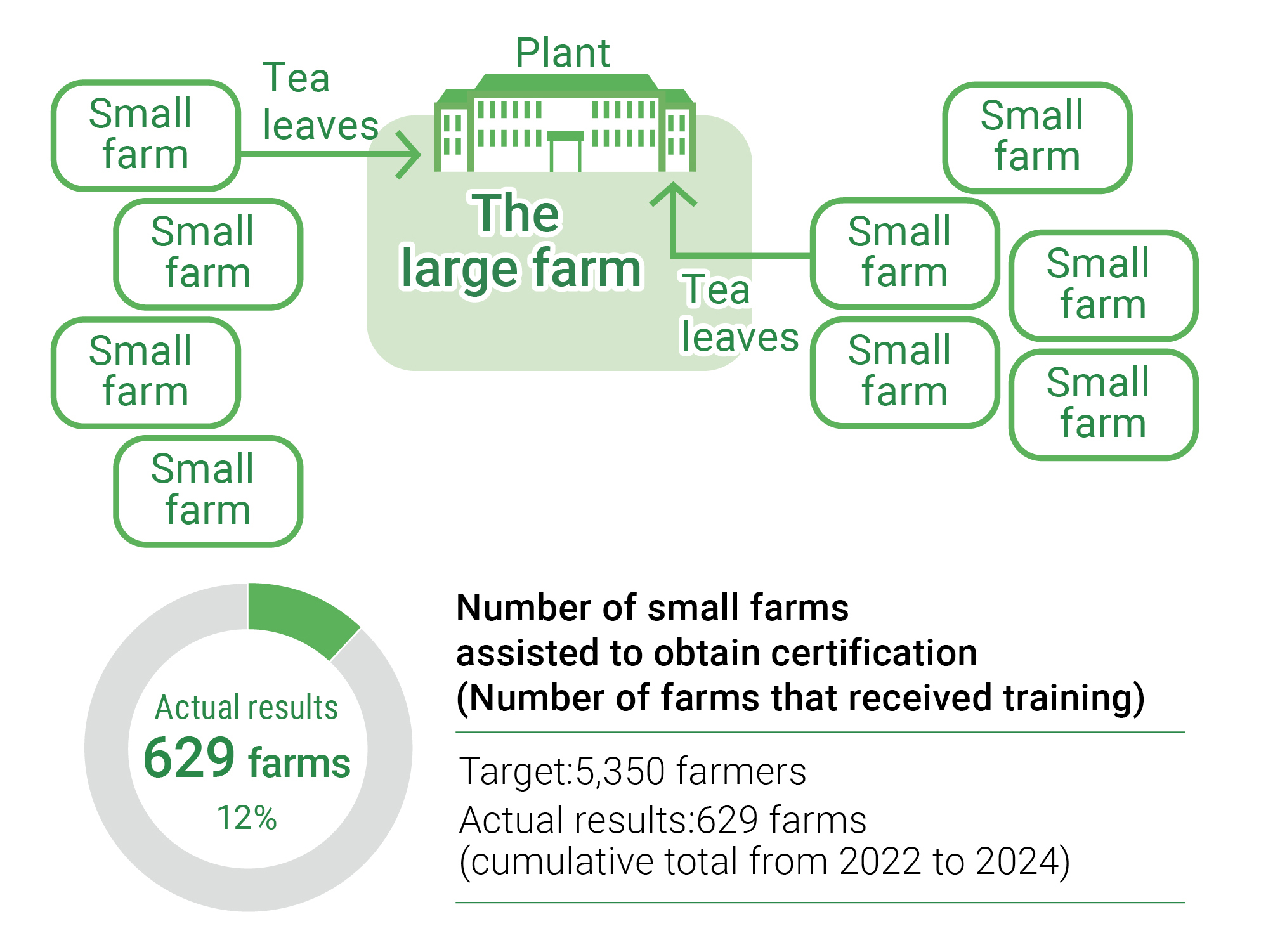
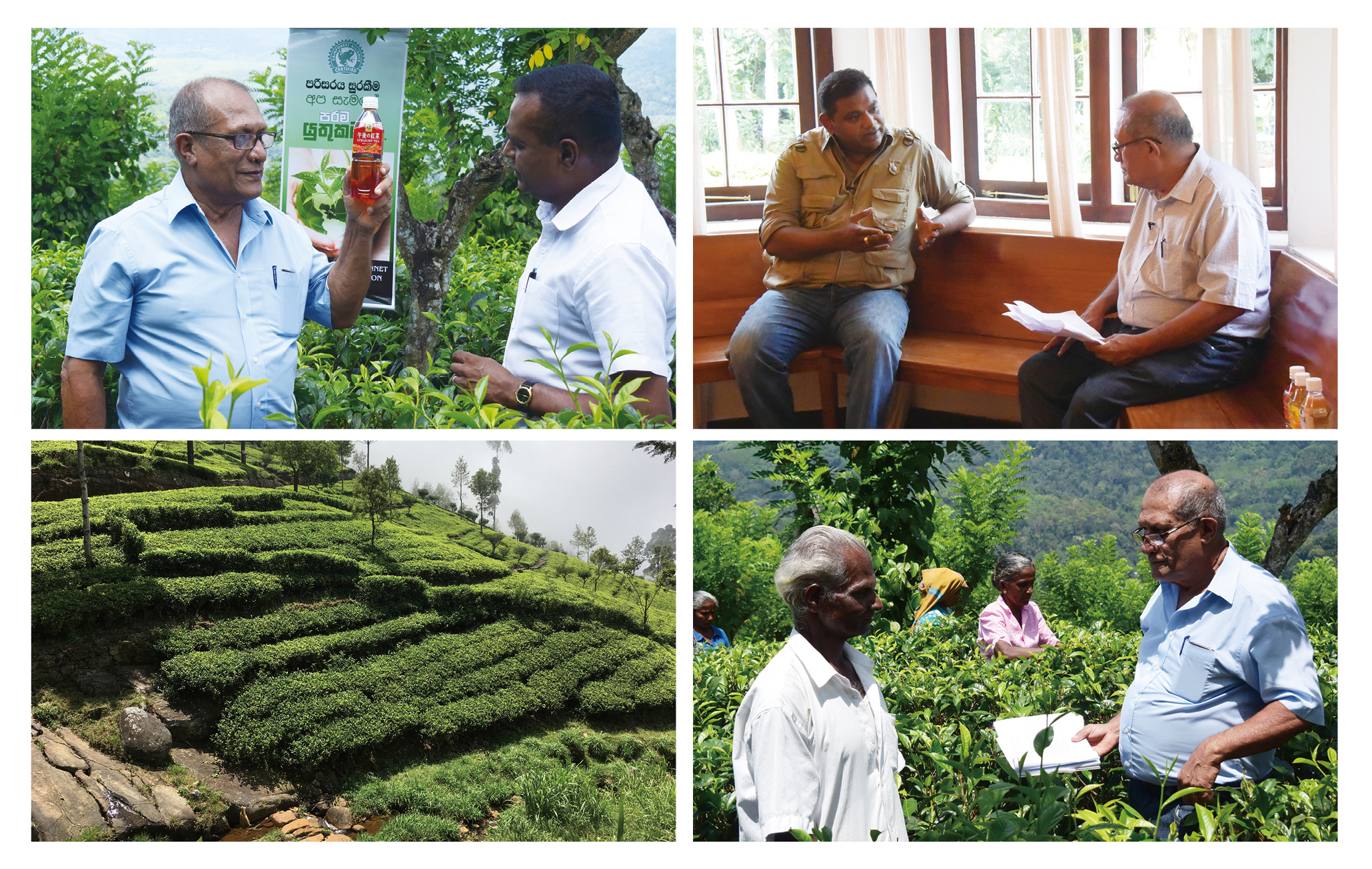
Book donations to elementary schools in Sri Lanka
In 2007, the year following the 20-year anniversary of Kirin Gogono- Kocha, we launched the Kirin Sri Lanka Friendship Project to further strengthen ties with Sri Lankan tea farms and continue to ensure stable production of tea leaves.
In Sri Lanka, tea is mostly grown in mountainous areas. Schools in those areas usually do not have substantial libraries. The Kirin Group donates quality books to elementary schools for the children of tea farm workers and continues to help the children to improve their academic abilities and envision their dreams for the future. We have donated to 242 schools and plan to continue to increase the number of schools to which we donate.
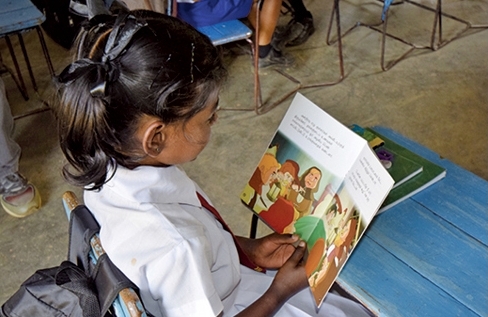
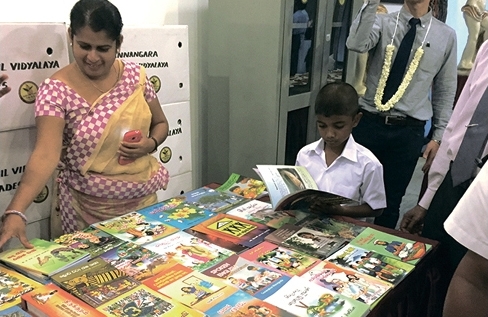
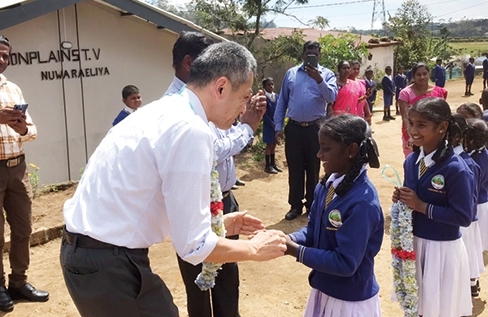
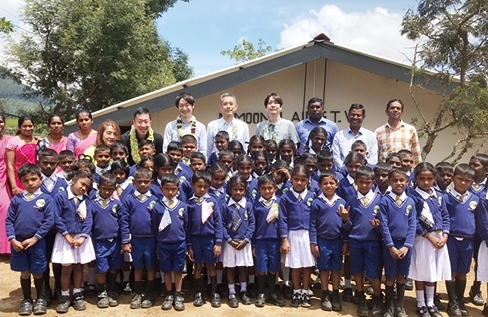
Vineyard
Nature Positive at Japan Wine vineyards Château Mercian Mariko Vineyard

Researchers from the National Agriculture and Food Research Organization (NARO) have confirmed the existence of 168 species of insects and 289 species of plants at Château Mercian Mariko Vineyard, on the Jinba Plateau in the Maruko district of Ueda City, Nagano Prefecture. We have been conducting ecological surveys since 2014, and the species that we have confirmed include endangered species listed in the Red Data Book of the Ministry of the Environment Japan. Many rare species, including endangered species, have also been found in Jyonohira Vineyard in Katsunumacho, Koshu City, Yamanashi Prefecture.
In addition to contributing to the expansion of our business, the conversion of derelict farmland into hedgerow-style vineyards for Japan Wine also creates valuable grasslands and contributes to the expansion and protection of Japan's traditional rural Satochi- Satoyama landscapes. There is a so-called "secondary nature" that is protected because of human efforts to preserve it. Grassland is a typical example of such nature. In Japan Wine vineyards, we regularly cut the undergrowth for vertical shoot cultivation. Regular undergrowth cutting creates an environment where fields function as high-quality, vast grasslands, enabling the development of native and rare species, without being dominated by highly fertile plants.
Mariko Vinyard will be positioned as an "Other Effective area-based Conservation Measure (OECM)," which is eligible for the global target adopted at COP 15 to "make at least 30% of land and sea conservation areas by 2030" (30 by 30). Grasslands are said to have covered 30% of Japan's national land area 130 years ago, but they have dwindled to just 1% today. The ratio of endangered plants per unit area is extremely high for grasslands (see chart below), and they play an important role in conserving biodiversity.
Château Mercian Mariko Vineyard was selected as Nationally Certified Sustainably Managed Natural Sites by Ministry of the Environment Japan in October 2023. It was the only site to receive approval as a certified business site growing agricultural raw materials at that time. In the future, we expect the Ministry of the Environment to register it as an OECMs in an international database and for us to be able to contribute to achieving the global target set forth at COP 15. We also plan to apply for other Château Mercian vineyards to be approved as Nationally Certified Sustainably Managed Natural Sites in order.
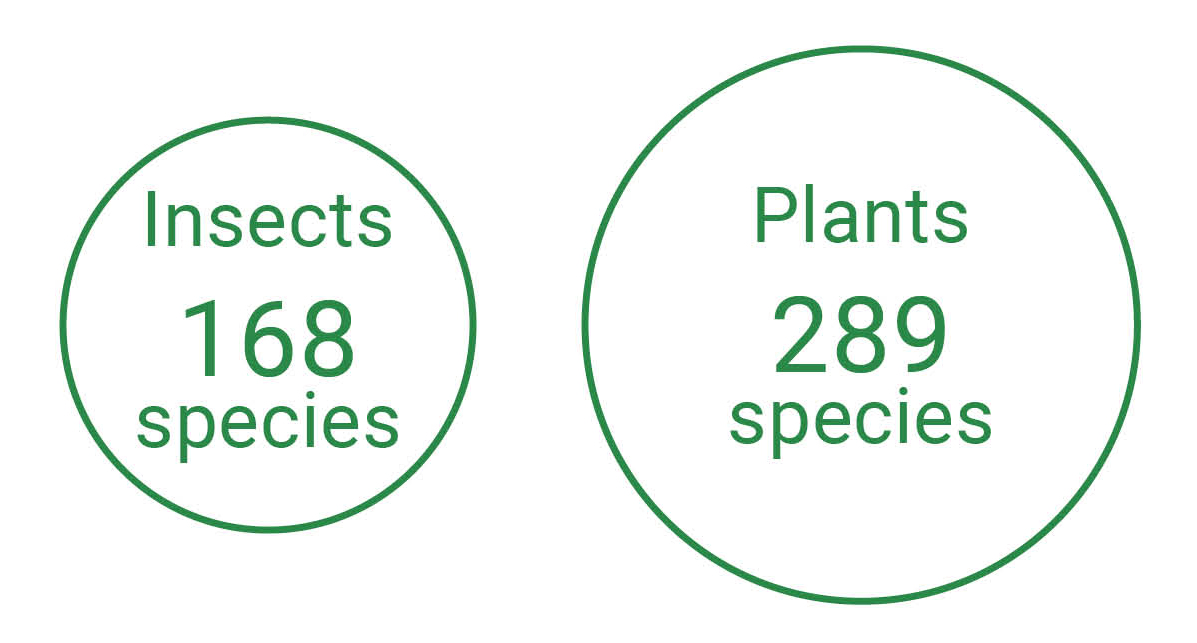
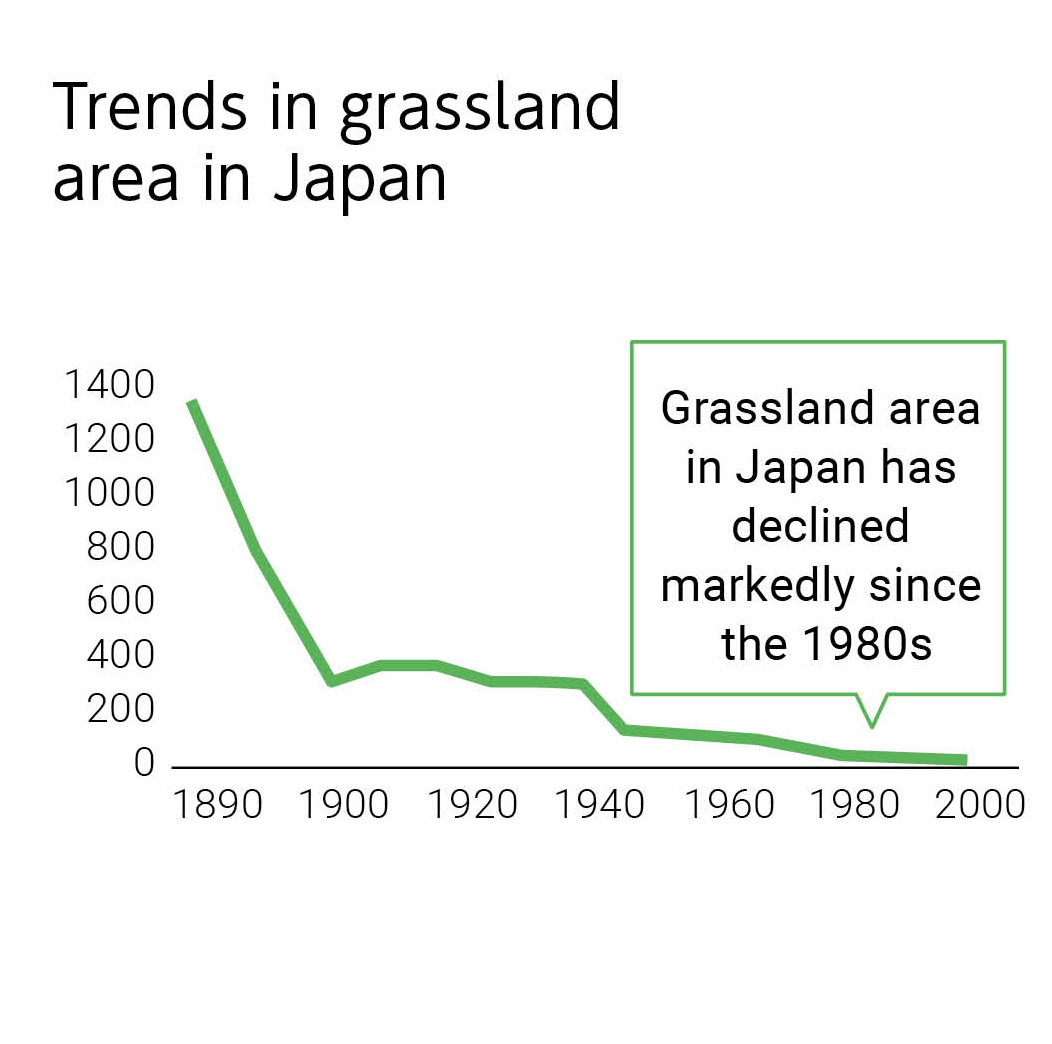
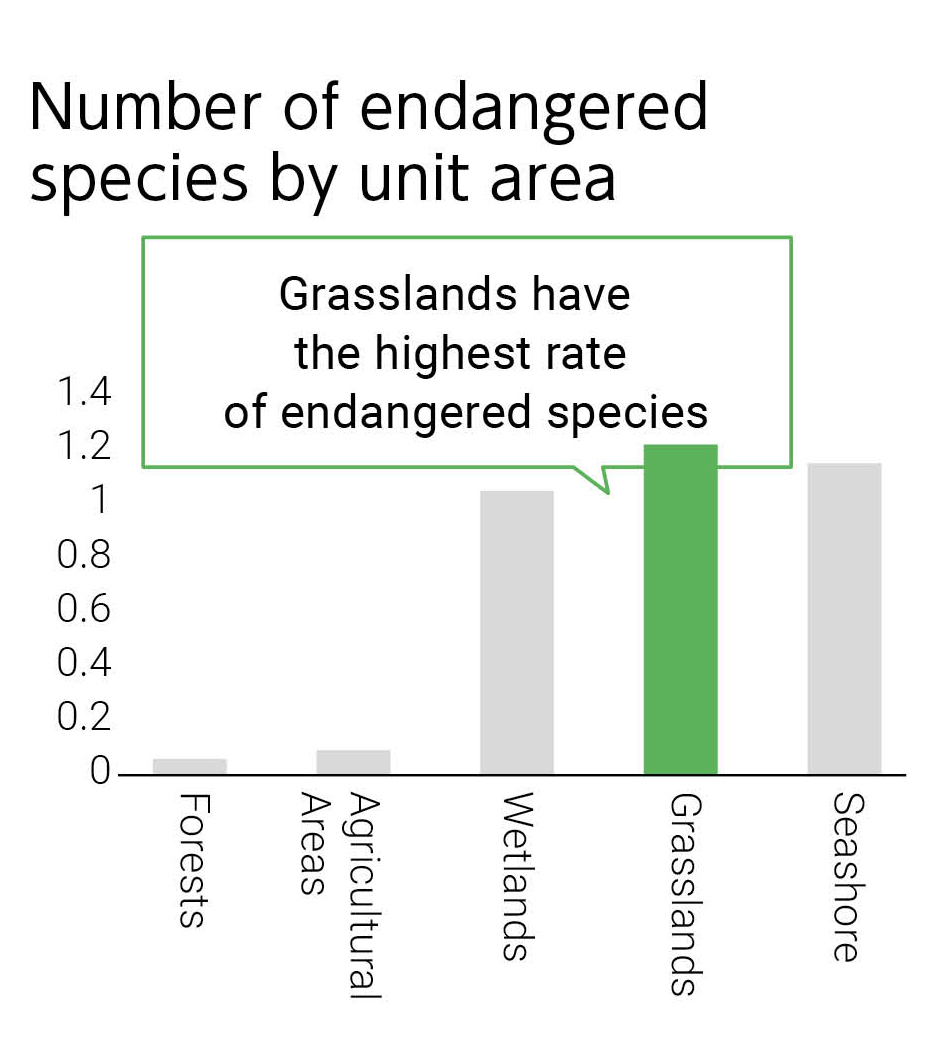
Papers by NARO related to vineyard ecosystem research are as follows.
-
Butterfly diversity in a vineyard developed from abandoned orchardsKoichi TANAKA, Yoshinobu Kusumoto (2022) Butterfly diversity in a vineyard developed from abandoned orchards. Nodai Entomology 3: 1-7.
https://www.nodai.ac.jp/agri/original/konken/shigen/publication/nodaient_contents/contents/3/3-1.pdf -
Vineyard bird diversityNaoki KATAYAMA, Hiroshi UCHIDA, Yoshinobu KUSUMOTO, Tomohiko IIDA(2022) Bird use of fruit orchards and vineyards in Japan: Mitigating a knowledge gap with a systematic review of published and grey literature, ORNITHOLOGICAL SCIENCE, 21(1), 93-114
https://www.jstage.jst.go.jp/article/osj/21/1/21_93/_article/-char/ja/ -
Recording of rare spiders at Mariko VineyardYuki G. BABA (2022) Fourth record of the ground spider Phaeocedus braccatus (L. Koch, 1866) (Araneae: Gnaphosidae) from Japan
https://media.niche-life.com/series/009/Niche009_26.pdf

We also conducted the first spider survey in a Japanese vineyard. We confirmed the existence of a rare species of spiders, including a species found for the first time in Nagano Prefecture, endangered species listed in the Red Data Book, and the fourth specimen of a rare spider found in Japan.
Studies into the process of converting derelict farmland into vineyards
Château Mercian Tengusawa Vineyard
Our joint research of ecosystem changes with NARO at Tengusawa Vineyard in Koshu City, Yamanashi Prefecture, is said to be rare case even on a global basis. The research has surveyed change of ecosystems while we convert derelict farmland into a hedgerowstyle vineyard.
At Mariko Vineyard and Jyonohira Vineyard, we began our surveys after vineyards were already well-maintained. On the other hand, at Tengusawa Vineyard, we have been able to make observations based on the condition of derelict farmland before development. Through these surveys, we are able to confirm that the development of derelict farmland into vineyards enriches ecosystems. In a survey in 2016, prior to the development of this land, insect and plant species were extremely lacking in diversity, as a result of damage from deer eating the vegetation. Since the vineyard was cultivated in 2017 and subsequently fenced off, we have seen a process of ecological enrichment as the deer-eating damage has decreased and the landscape
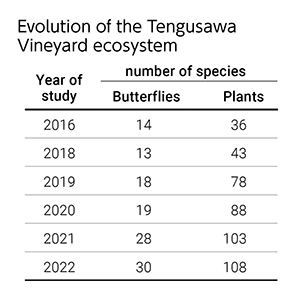

Joint research on upgrading biodiversity assessment in fields and assessing the carbon storage effect
In March 2024, the Kirin Group, in a joint research project with NARO, began working to upgrade the biodiversity assessment of vineyards at Mariko Vineyard and assess the carbon storage effect, which is a measure to mitigate climate change. When upgrading the biodiversity assessment, we will analyze and evaluate the contribution of the rich ecosystem at Mariko Vineyard to the Jinba Plateau and surrounding ecosystems and explore the possibility of contributing to the restoration and maintenance of ecosystems in the area where the vineyard is located. We will also examine the possibilities for ways that hedgerow-style vineyards can contribute to the stable cultivation of high-quality grapes.
As a measure to address climate change, we plan to accumulate knowledge about regenerative agriculture*1. Greenhouse gas (GHG) emissions from agriculture account for about one quarter of global emissions, and approximately 25% of the Kirin Group's Scope 3 emissions come from agricultural raw materials. Accordingly, we will accurately measure and understand GHG emissions from vineyards and evaluate the carbon storage effect of biochar utilizing pruning debris from vineyards. In addition, we will assess the potential of regenerative agriculture as a measure to mitigate climate change, and consider its expansion to other agricultural raw materials.
-
*1Regenerative agriculture refers to sustainable agriculture that reduces environmental impact from the use of chemical fertilizers and agricultural chemicals through soil preparation and other means, while taking advantage of the material recycling function of agriculture and working to achieve harmony with productivity.
-
*2Pruning debris refers to branches, etc., that are cut off when pruning grapevines.
-
*3Biochar is a solid material produced by heating biomass (biological material) at a temperature of 350°C or higher under oxygen concentrations controlled at non-combustion levels. In addition to its carbon storage effect on soil, biochar also improves soil water permeability and is used as a soil improvement material.
Coffee farms
Since 2020, the Kirin Group has supported coffee farms in Vietnam to acquire Rainforest Alliance Certification. We are expanding our activities from tea farms in Sri Lanka to coffee farms in Vietnam, leveraging our experience of the support. By the end of 2022, 350 farmers of Robusta were certified and 309 farmers of Arabica have completed the transition to Rainforest Alliance certification. In the past, Arabica coffee farmers were certified by UTZ.
Due to the global spread of COVID-19, it was difficult to visit the sites since the spring of 2020, immediately after the start of the support. In October 2022, we visited small farms receiving support in Da Lat City, the Lam Dong Province, located in central south Vietnam. Through our visit, we found that the farmers lacked agricultural knowledge because they received little technical assistance although the government encouraged them to become coffee growers. We were also able to confirm that certification training contributes to a certain degree to the sustainability of coffee farms.
From 2024, we will move the field of our action to Gia Lai Province, Vietnam, where we plan to support 1,400 Robusta producers to obtain certification over three years. In these activities, we will focus on integrated pest management (IPM), regenerative agriculture, and water source conservation activities. Specifically, we will train farmers to produce biofertilizers themselves, utilizing coffee husks and agricultural waste to reduce chemical fertilizers and thereby reduce expenses for farmers. We also aim to improve productivity by contributing to prevention of soil erosion and the maintenance of groundwater levels through measures such as shade cultivation, provision of seedlings for wind breaking forests, and the practice of cover cropping.


Hop fields
We have been conducting an ongoing living species survey in the hop fields of contracted farmers in Tono City since 2014. In 2015, we confirmed the existence of 104 species of insects and 19 species of birds.
Hop fields are plowed every year, so the fields themselves do not have the function of enriching the vegetation, but the fact that windbreaks were created and maintained for hop cultivation and that hop fields continue to function as one of the rich ecological systems in Satochi-Satoyama can be said to have contributed to the richness of the vegetation.
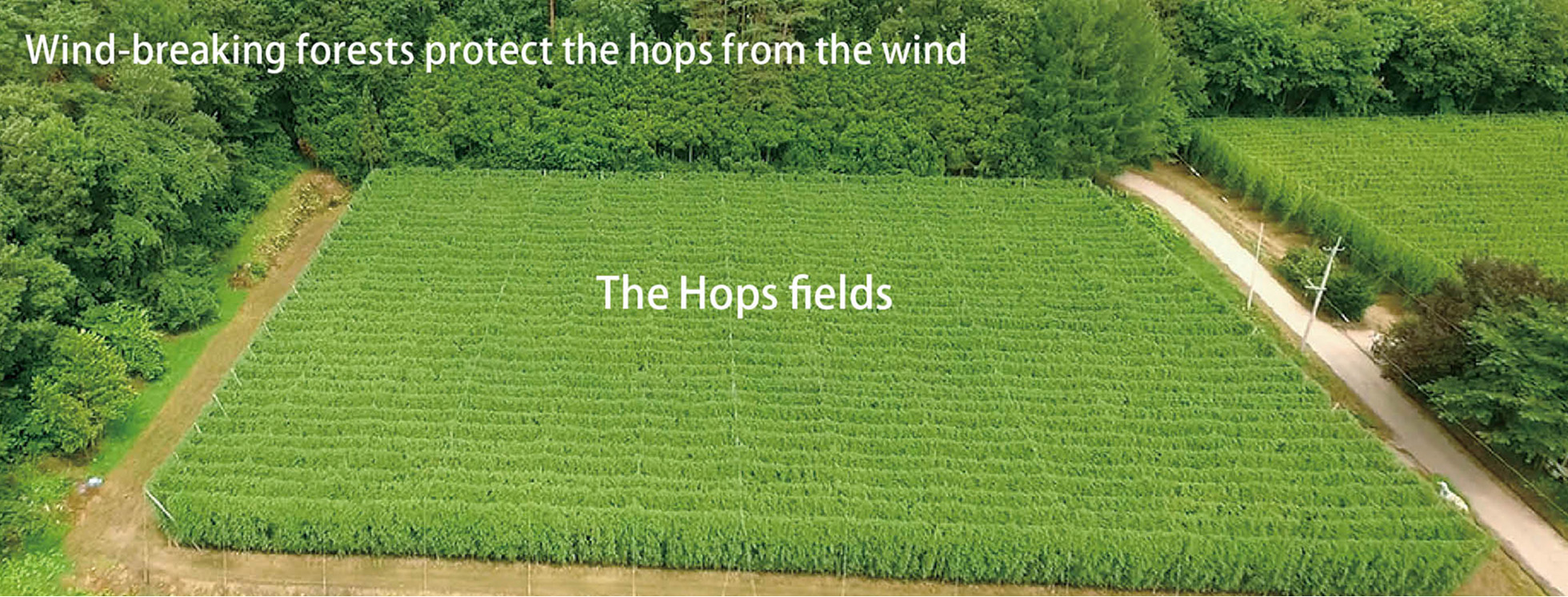
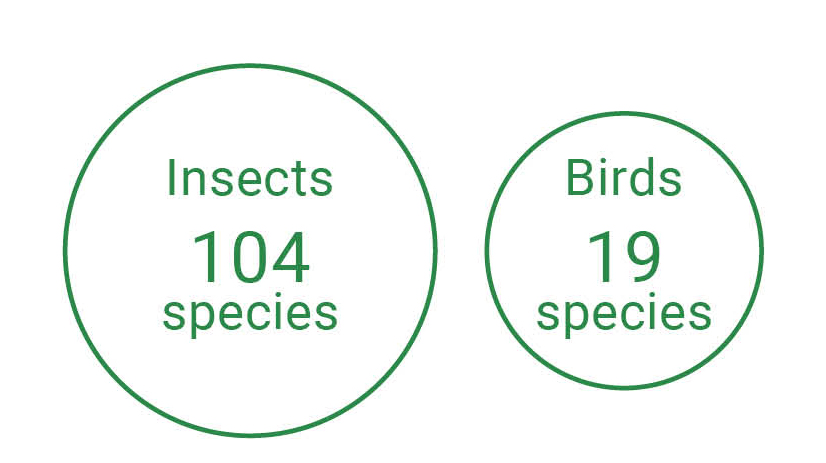
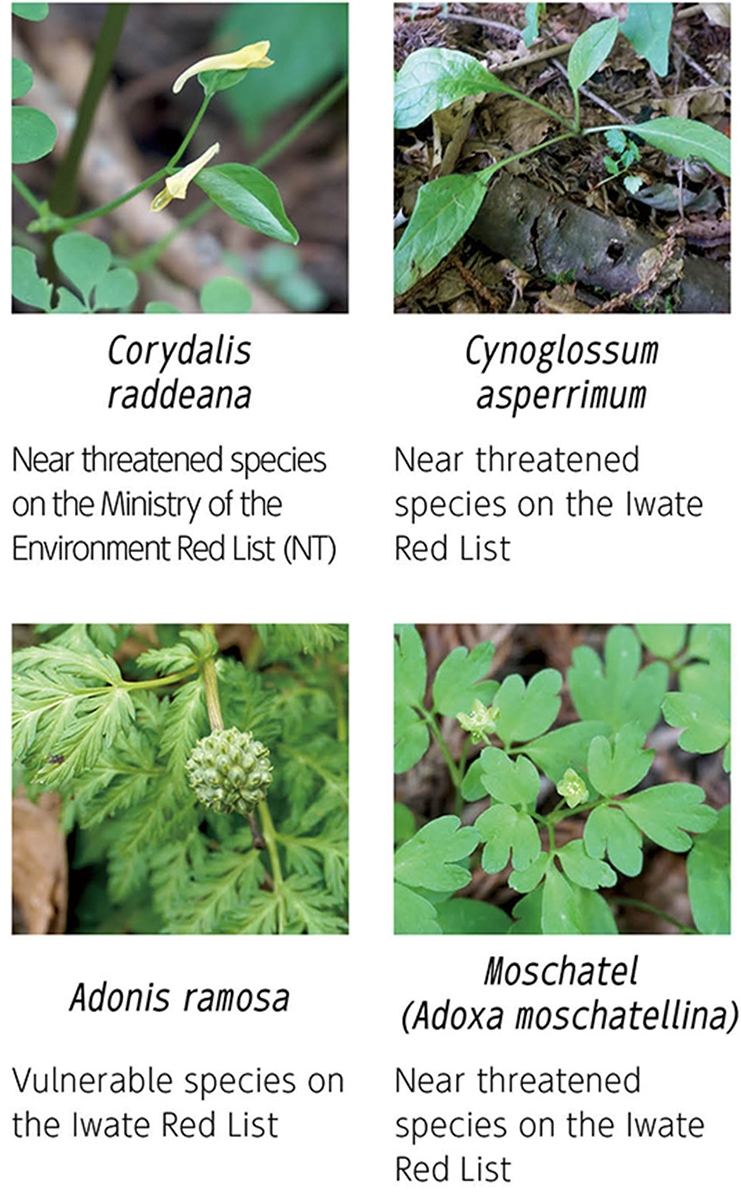
Palm oil
The Kirin Group uses palm oil in some of its products, but the quantity is very small. As a result, it is difficult to procure physically certified oil, so we have adopted the Book & Claim method approved by the Roundtable on Sustainable Palm Oil (RSPO) for the procurement of certified sustainable oil (excluding palm kernel oil).
In accordance with our Action Plan for the Sustainable Use of Biological Resources, we have been calculating our usage of palm oil in accordance with predetermined standards for palm oil used as a primary raw material from 2013 and as a secondary raw material from 2014, and we use RSPO-certified oil for the full amount (excluding palm kernel oil). We became an associate member of the RSPO in March 2018 and a regular member in FY2022. Since 2021, we have been a member of the "Japan Sustainable Palm Oil Network (JaSPON)," in order to accelerate the procurement and consumption of sustainable palm oil in the Japanese market as a secondary raw material.
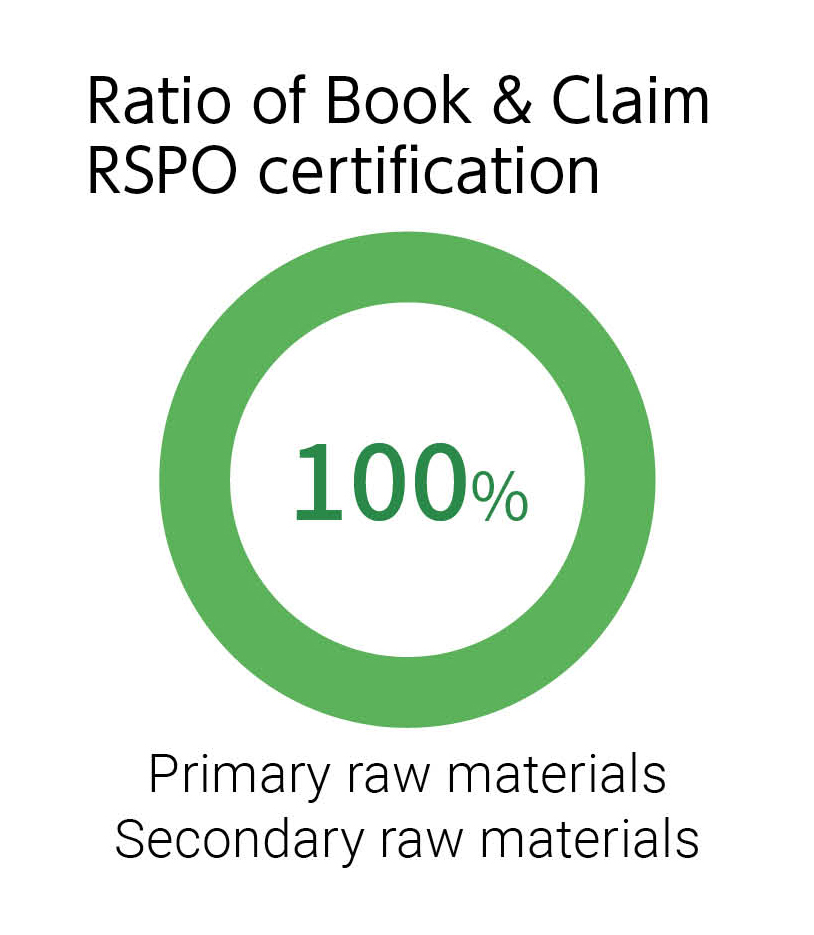
Mass plant propagation technology
Kirin's mass plant propagation technology consists of four underlying technologies: stem propagation technique (organ culture method), sprout propagation technique (PPR method), embryo propagation technique (somatic embryo method), and potato propagation technique (micro tuber method). This original technology is globally unprecedented. Plant propagation is normally performed using seeds and cutting. These methods result in a limited cultivation period, and the growth rate can be low depending on the plant. However, Kirin's mass propagation technology that we developed through our own research makes it possible to significantly increase the number of quality plants with the same characteristics as the parent plant, regardless of the season.
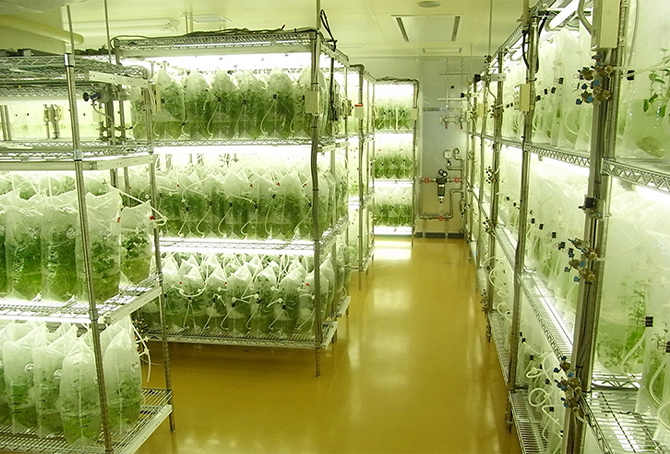
Paper and Printed Materials
In the Action Plan that we revised in February 2017, we declared our aim of using 100% FSCcertified paper or recycled paper by the end of 2020. This target covers paper containers in Japanese Alcoholic and Non-alcoholic Beverages Business, as well as all office paper such as copy paper, envelopes, business cards, company brochures, and other printed materials. We successfully completed the switch to 100% FSC-certified paper or recycled paper in November 2020. Currently, we are promoting the use of FSC-certified paper for paper bags with the KIRIN logo, application postcards for prizes, and some paper cups for tasting. We plan to expand these activities to other businesses in Japan and overseas in the future.
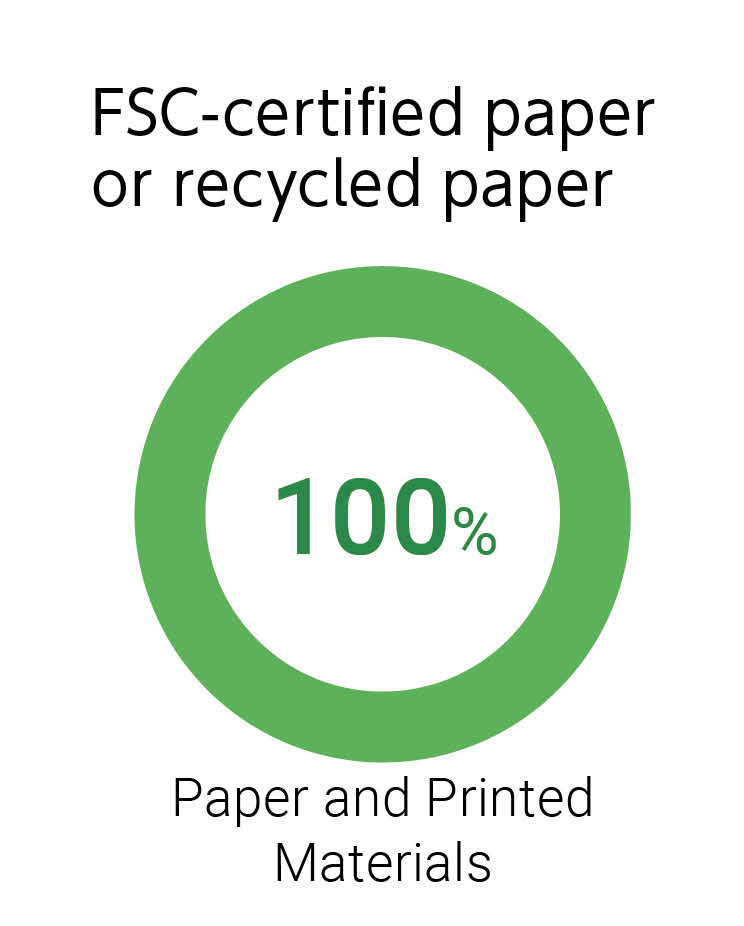
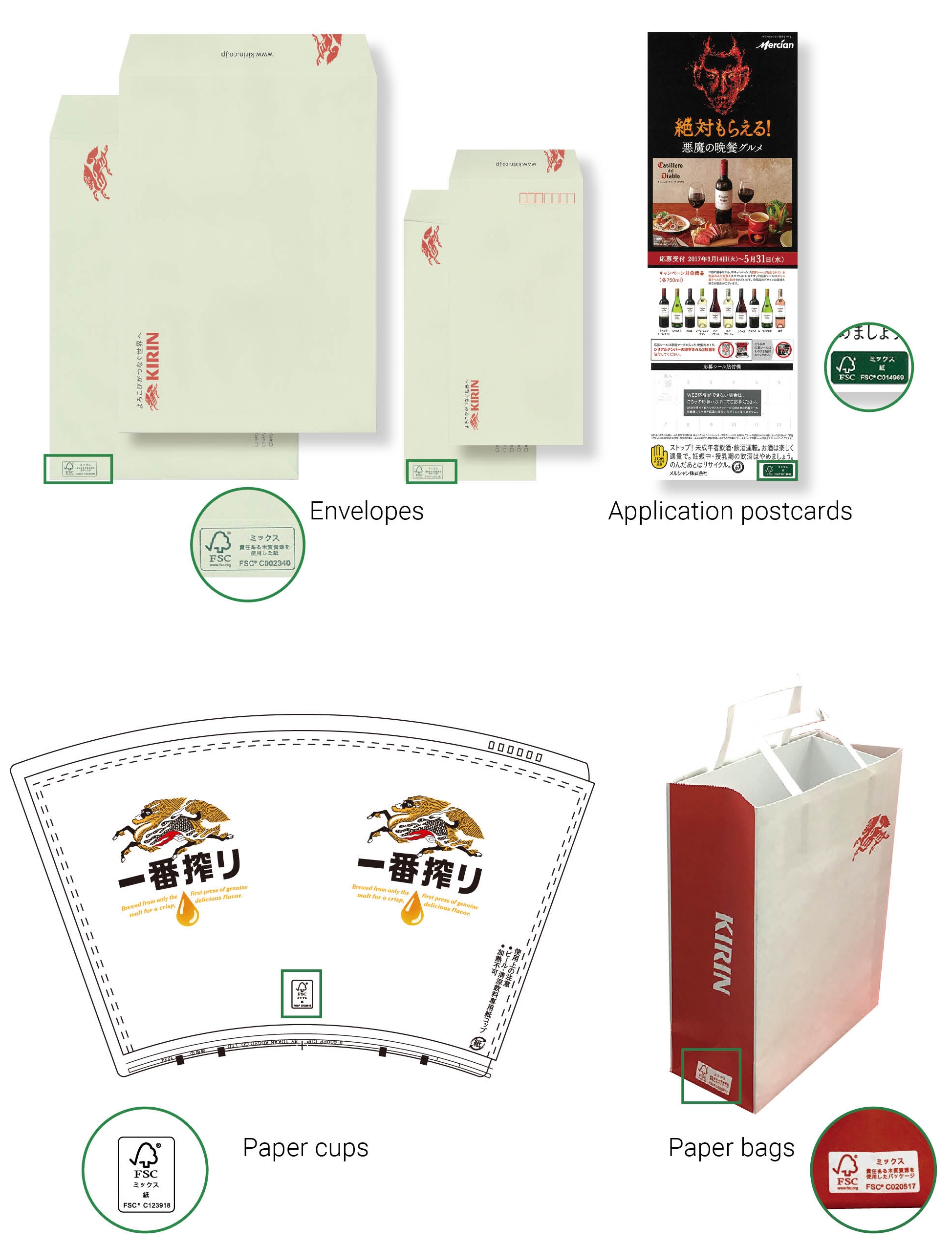
FSC®C137754
-
*1The Forest Stewardship Council (FSC) Forest Certification System is a system for the appropriate management of forests and the sustainable use and conservation of forest resources. The FSC label is a mark that protects forests.
-
*2The information above is current as of June 30, 2022. Photographs of envelopes, paper cups, etc., may be as of the time that events occurred, and do not necessarily represent the latest versions.
-
*3For more information on the use of FSC-certified paper for paper containers, please see "Sustainable Paper Containers."
Food Waste Reduction and Recycling
Reduce product waste losses
To continually reduce waste loss, we optimize our operation by improving demand forecasting, for example by closely sharing information on demand fluctuation with plants and distribution centers.
In addition, strict management of sales volume targets ensures that valuable biological resources, containers and packaging are not wasted.
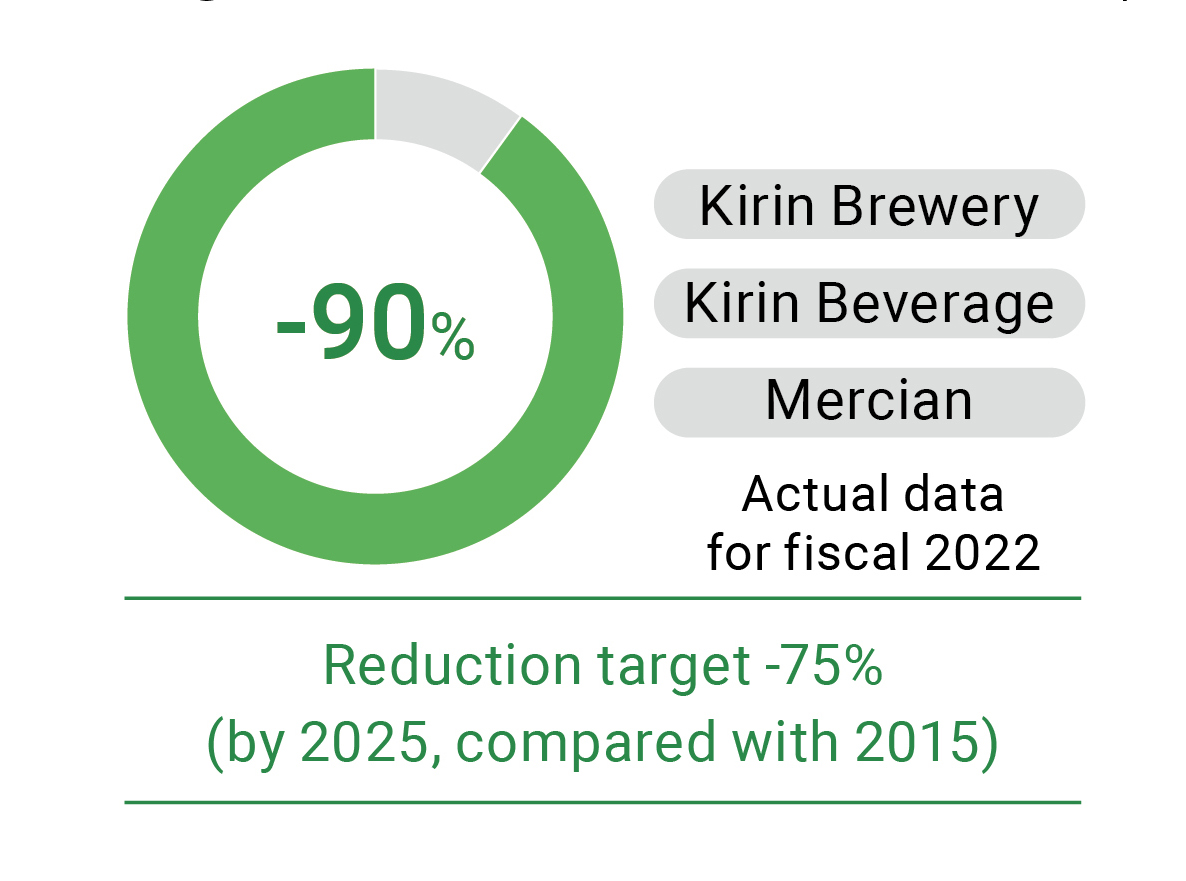
Continuous donation of surplus inventory* to local governments and food banks
We are making various efforts to reduce food waste, but there are still cases when we cannot avoid generating excess inventory because of gaps between demands and supplies. Since 2022, Kirin Beverage has donated excess inventory to local governments, food banks, for effective use by those in need.
-
*Products that cannot be shipped because it takes time for them to reach the customer, even if there are no quality issues and they are within the expiration date.
Recycling
- Conversion of spent grain into livestock feed
- The spent grain from beer production still contains nutrients and is effectively used for cattle feed and culture media of mushrooms.
- Developing food products from brewer's yeast
- Lion continues to supply brewer's yeast for use as an ingredient in the Australian fermented food, Vegemite.
- Reuse of spent grapes
- Spent grapes from wine production are "turned over" for a period of one year in a compost heap on the company vineyard and reused as compost (organic fertilizer).
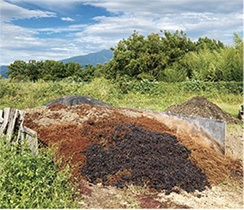
- Effective use of shochu spent grain
- Since 2015, we have been supplying some of the residue (shochu spent grain) generated from shochu production in Mercian's Yatsushiro Plant to hog farmers in Kumamoto Prefecture. In the six years from 2015 to 2020, farmers used 7,158 tonnes of shochu spent grain as livestock feed. In 2019, Kirin Holdings, Mercian and the University of Tokyo jointly confirmed for the first time in the world that shochu spent grain can reduce stress among hogs and improve the taste of pork, demonstrating the potential for the effective use and creation of value from shochu spent grain.
Since livestock feed alone is not enough to process the shochu spnet grain generated daily, we try to avoid the grain to be waste as much as possible by using the grain as a raw material for compost or as a microbial nutrient source for activated sludge in paper mills. In 2021, our initiatives to utilize shochu spent grain as livestock feed received praise, and our Yatsushiro Plant won the "Fiscal 2021 Circular Economy Creation Promotion Merit Commendation of the Minister of the Environment Japan"
Support for the restoration of nature
Educational program for wildlife conservation in Sri Lanka
Kirin Beverage is funding an educational program for wildlife conservation for young people in tea farms in Sri Lanka. Leopards, which are at the top of the food chain in the Sri Lankan ecosystem, are often caught and killed in traps set by local people, increasing the need to educate the plantation and local people about the importance of preserving the ecosystem. In 2020, a black leopard was found in a trap. The black leopard in Sri Lanka is a mutation of a leopard that has not been seen in more than a decade. This black leopard that was caught in the snare was transported to the Department of Wildlife's animal hospital at the Elephant Transit Home bordering the Udawalawe National Park but unfortunately succumbed to its injuries and stress a few days later. In the wake of this incident, Sri Lankan NGOs, the Department of Wildlife Conservation, academic experts, and farm managers passionate about environmental conservation came together to plan a pilot project to educate young tea farmers about the local ecosystem. Kirin Beverage helped implement this project through funding support. This program is implemented several times a year.
Lecturers include researchers from the Tea Research Institute of Sri Lanka and representatives from environmental NGOs. Dozens of young people who live on the farms receive two days of on-farm classroom training and four days and three nights of field training at Horton Plains National Park. Over 200 youth have already participated, and there have been some examples of students in the first program finding work in environmental NGOs and the administrative departments of Horton Plains National Park.
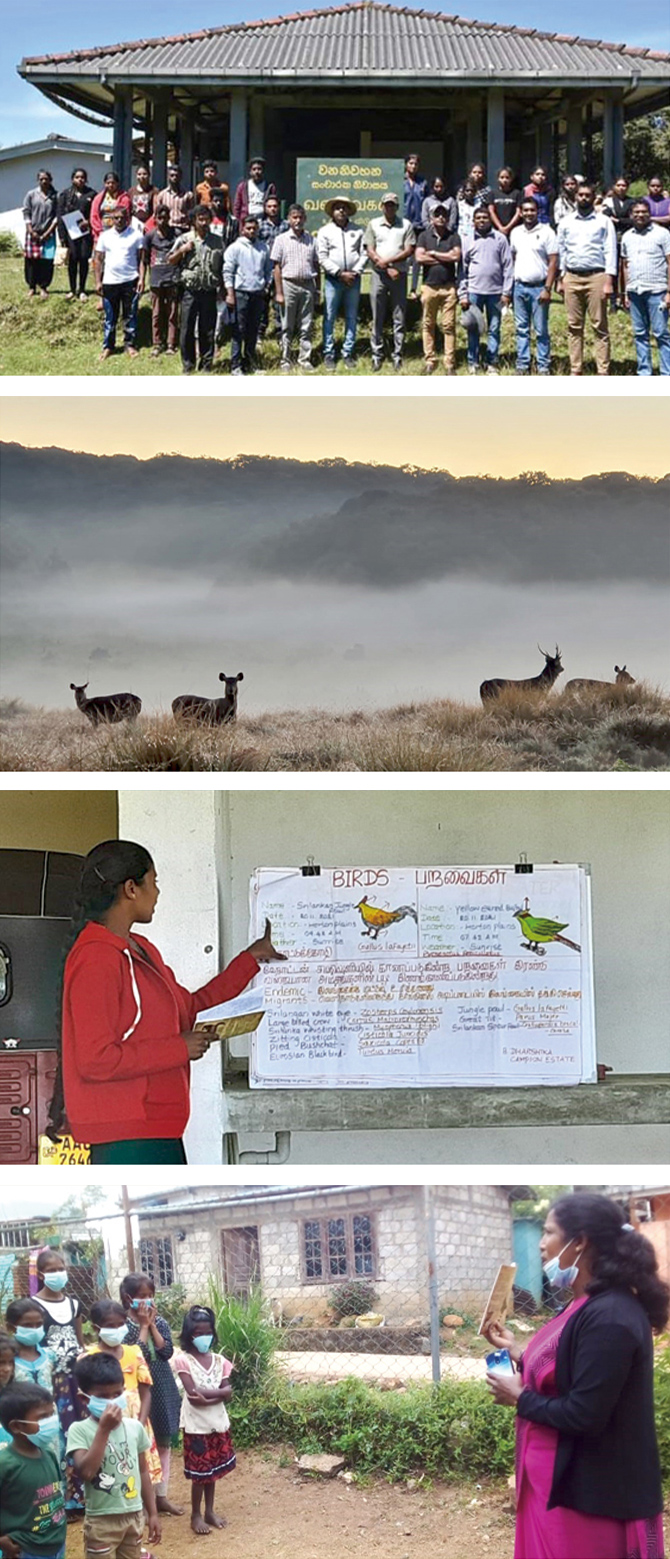
Revegetation activities at Château Mercian Mariko Vineyard
In 2016, under the guidance of specialists, we started efforts to expand the habitats of rare and native species in the fields of Château Mercian Mariko Vineyard through revegetation activities with the participation of employees. Château Mercian values coexistence with nature, local communities, and the future. By collecting dry grass from the habitat of rare and native species and seeding it back into the field, Mariko Vineyard aims to regenerate vegetation from the seeds in dry grass that is sown. In the area where we regenerated vegetation, the average number of species present in 2016 was 8.2, but by 2021 this number had increased to 17.9.
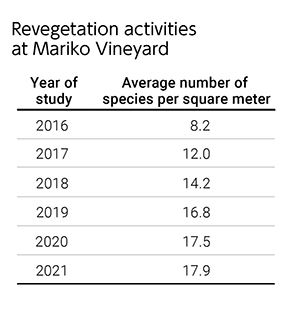
Activities to increase shrubby sophora in Mariko vineyard
Along with an NGO and local elementary school students, we also engage in activities to increase shrubby sophora (Sophora flavescens) in Mariko Vineyard. In 2019, international NGO Earthwatch Japan and its volunteers collected, with the permission of the rice field owners, cuttings of shrubby sophora, and grew them. Two years later, at the end of May 2021, we planted the seedlings at Mariko Vineyard. Furthermore, since 2021, Shiogawa Elementary School, a local school where Mariko Vineyard is, has participated in activities to increase shrubby sophora. The school grew cuttings in a flower bed in the schoolyard and planted them in Mariko Vineyard at the end of May 2022. We also invite a lecturer from NARO and hold environmental classes for students at the school. We continued these initiatives in 2023.
Activities to increase shrubby sophora
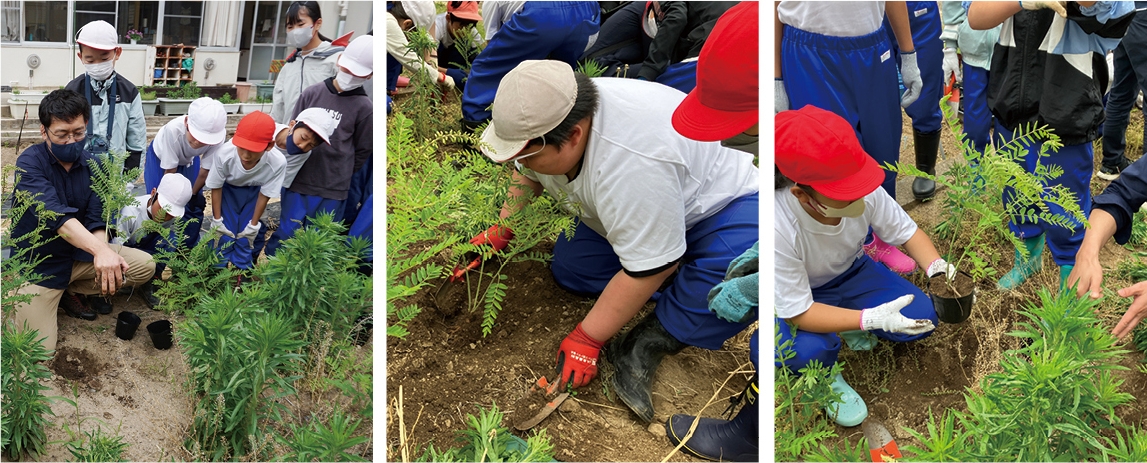
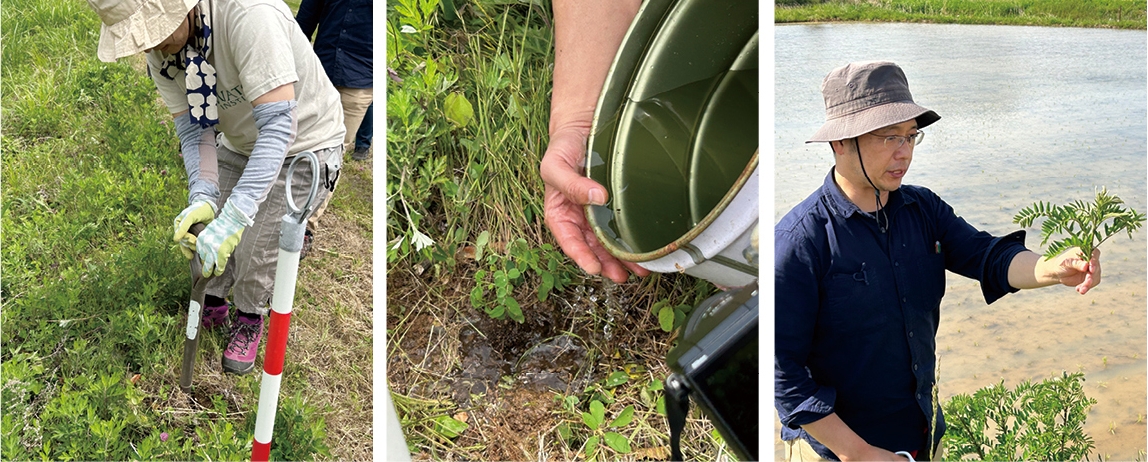
Protection of endemic species in biotopes at manufacturing plants
At the Kirin Brewery's Yokohama Plant, in an endorsement of the"Yokohama b Plan," the city's biodiversity action plan, we built a biotope in the grounds of the plant in the summer of 2012. The Yokohama Brewery, which is part of a widespread network of ecosystems, is pursuing initiatives to enrich the local ecosystem as a whole.
The Kirin Brewery's Kobe Plant has been cultivating local endangered species, including the fish species, Hemigrammocypris rasborella (golden venus chub), and Pogonia japonica, a species of orchid, in the biotope that we set up in 1997. This biotope functions as a "refuge biotope" for the protection and cultivation of local endangered species. Our initiatives to date at our Kobe Brewery have won praise, and in 2018, we were awarded the "Fiscal 2018 Greening Promotion Merit Award of the Prime Minister."
Since 2005, Kirin Brewery's Okayama Pant has been involved in activities with local communities to conserve the Ayumodoki (Parabotia curtus), a nationally designated natural monument. Every year, farmed Ayumodoki raised by a local elementary school are released into the biotope on the site, and in cooperation with the Organization for the Protection of Ayumodoki in Seto and other specialists, etc., we work to improve the environment to make it easy for Ayumodoki to grow, and conduct regular ecosystem surveys.
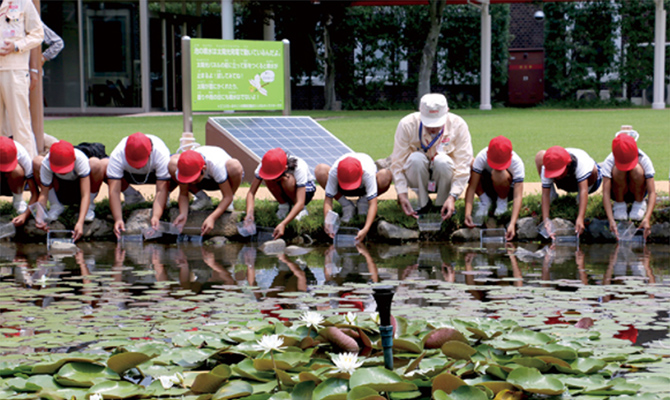
Key Data Related to Biological Resources
